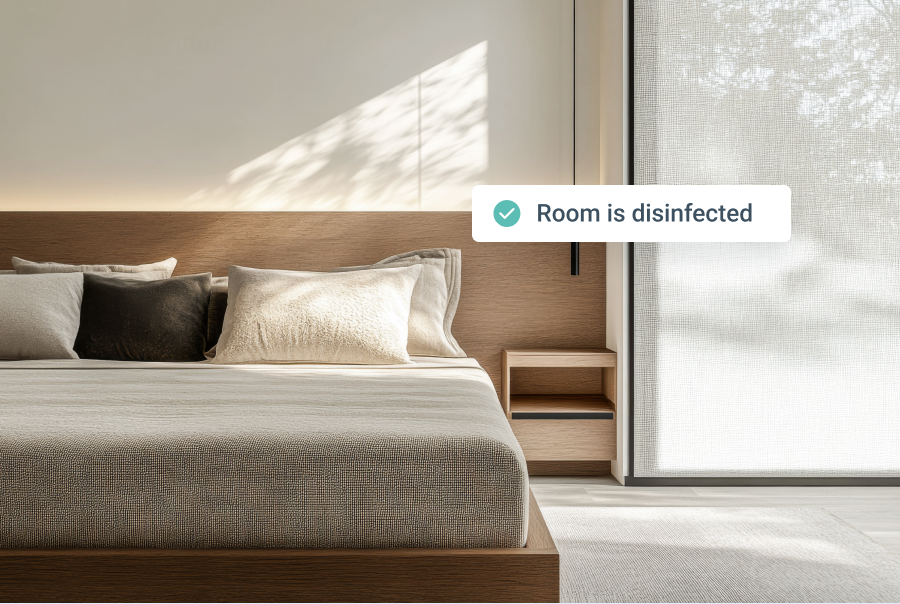How Hospitality Tech Keeps Staff Safer Now and in the Future

Coronavirus has turned the hospitality industry on its head with many hoteliers understandably concerned about when business will pick up again in the future. Fortunately, it is only a matter of ‘when’ and not ‘if’ guests return. In the meantime, many hotels and hostels have opened their doors to provide housing for those who need them most; travelers stuck away from home and medical professionals on the front lines. However, open or closed, the question for property managers is now: How to ensure that your workers stay safe while operating a property, both now and after the crisis has passed? An important part of the answer is hospitality tech, and how you use it.
For decades, people have said that technology creates distance between people. Luckily, they are correct. Technology allows people to communicate and coordinate from a distance (or at least farther than the CDC’s recommended 2 meters). This is vital in the hotel industry. Operation platforms, custom-designed to manage properties, are used to synchronize your staff, organize workflows, and improve daily operations.
In addition to automating and expediting operations, here are some critical ways that hospitality tech can keep your staff and guests safe:
Reduce Contact
According to the CDC, COVID-19 is spread mainly through close person-to-person contact (2 meters or less) and bodily fluids (a cough or sneeze). Unfortunately, many supervisors continue to meet face-to-face with staff to manually update the status of each room. This often requires both parties to handle a physical spreadsheet. While the CDC has stated that transmission across surfaces is not the primary method of infection, it also has claimed that it “may be possible.” Regardless, sharing materials still poses an unnecessary health risk as many more common germs and diseases can potentially be spread.
By contrast, hotel operation management software allows supervisors to virtually check on housekeepers’ progress from a distance, keeping both parties safe. Even when there aren’t global health concerns, hospitality tech keeps staff safer. Fewer face-to-face interactions and remote monitoring help limit the spread of any disease, COVID-19 or other.
Staff Can Act Independently
With hotel operation software, staff no longer need to wait for assignments – they can simply check their phones. Once a housekeeper cleans a room, they can also mark it as needing inspection through their phone. Their supervisor can inspect it later without ever having to cross their path. This same process can be applied to every department, from maintenance to food preparation.
Hospitality professionals can receive, comment on, and complete their daily tasks with absolute autonomy. Hospitality tech solutions bring the unique advantage of being able to work safely and efficiently without compromising the quality of service.
Track Guest Information
When integrated with your property management system (PMS), platforms such as Flexkeeping can store and retrieve guest information for staff. Checkout times are clearly displayed so staff can plan accordingly when to clean without running into guests. And if days later, a guest is reported to have been exposed to the virus, there is a clear record showing which room they stayed in, when it was cleaned, and by whom.
Properties that are temporarily closed due to Covid-19 can still significantly benefit from checklists.
Manage Remotely
In a situation such as a quarantine where a department head might not be on the property, they can still provide support to their staff from their phone. They are able to remotely view operations, create and assign tasks to staff, and monitor progress. Maintaining a sense of normality during emergencies contributes to keeping everyone calm, and ultimately, safe.
Utilize Checklists
Checklists are a tried and true method of ensuring health standards and superior service. We’ve certainly sung their praises before in another article. However, this unique situation highlights how they help to ensure that all hygiene rules are met. Digital checklists help staff and supervisors stay on track with tasks, adhere to daily SOPs, and follow protocol when starting and finishing the workday. While cleanliness is paramount, it’s more than housekeepers who can benefit from checklists.
Properties that are temporarily closed due to COVID-19 can still significantly benefit from checklists. Digital checklists help to conduct safety checks (e.g. fire alarms, switches, electronics), prevent legionella, and perform comprehensive close-down procedures.
Keep Staff Informed with Live Updates
In emergencies, it’s necessary to act quickly. Circumstances can change due to new travel restrictions or government alerts, so it’s important to keep your finger on the pulse. That includes informing your hospitality team. They need to stay connected and work as a synchronized unit to update guests and ensure the highest standards of health and security.
For example, the government could send out advisories recommending that public spaces be closed. You could immediately inform all staff members with a few clicks to close and redirect guests away from areas such as the gym, pool or sauna. In scenarios such as quarantine, all departments can be notified and given standard responses to address guests’ questions and concerns.
According to a 2019 scientific study, implementing effective communication can lead to a 22% decrease in an outbreak’s perceived risk. Proof that a calm, well-informed, and united front from staff goes a long way to reassure guests and keep everyone safe.
While we never imagined our product in a situation such as COVID-19, we are proud that our features can contribute to the overall safety of staff and guests. Therefore, if you would like to take advantage of our services, you are welcome to start right now and at no cost for the next 60 days. We hope that after that period, the situation will begin to improve. For us, hospitality represents sharing what you have with others, and there is no better time to amplify that message than now.
